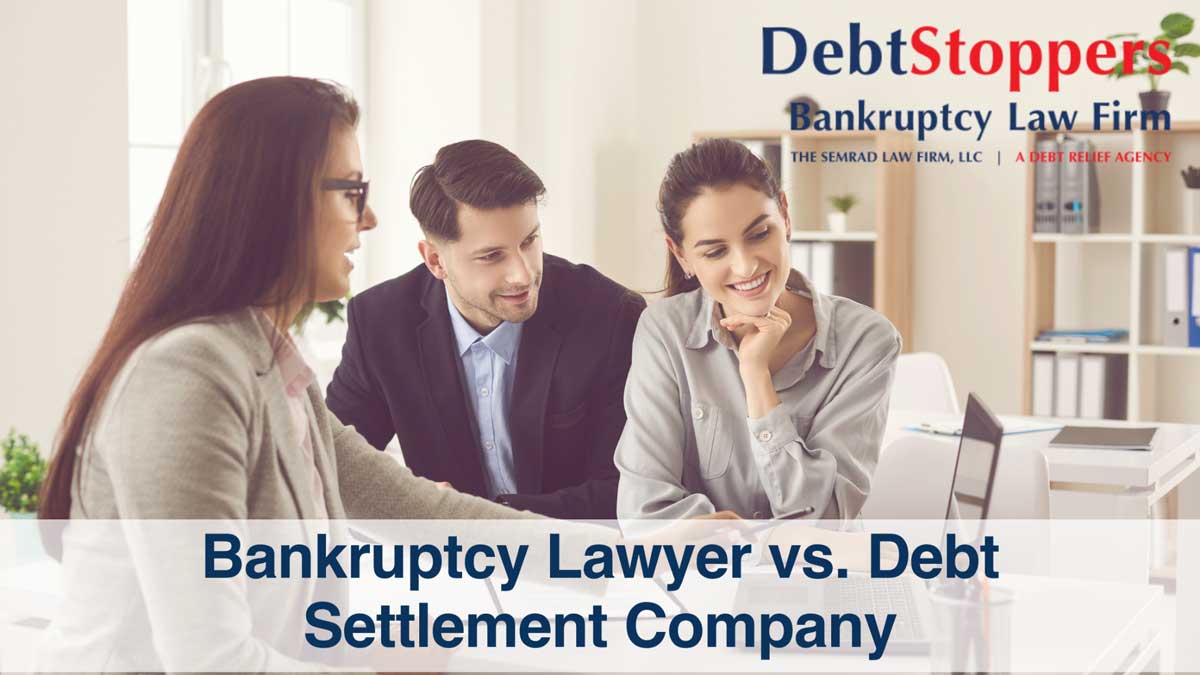Bankruptcy Lawyer vs. Debt Settlement Company
Updated on 04 February 2025

If you’re feeling overwhelmed by your debts, it can be difficult to know where to turn. Unfortunately, self-styled "debt settlement" companies often take advantage of the vulnerabilities of struggling families and collect hefty fees without delivering the promised relief. In fact, many people end up in a worse financial situation after working with one of these businesses.
For this reason, it’s undeniable that a debt consolidation attorney is the superior option. Read on to learn more about how a skilled debt settlement lawyer can best represent your interests when you are trying to find a way to make ends meet. And don’t pay a single penny to one of the companies if you haven’t discussed your options with an attorney.

What Do Debt Settlement Companies Do?
Debt settlement or “relief” companies are for-profit businesses that claim they can reduce your balances by negotiating with your creditors on your behalf. However, there are significant risks involved in working with one of these agencies.
According to the Consumer Finance Protection Bureau, dealing with these companies can be perilous. In part, this is because these businesses charge substantial fees that you must pay before they deliver any of the relief they promise. If your creditors refuse to negotiate with them, which they often do, or they are unable to settle your debts, you won’t get a refund. And even if they manage to negotiate a debt settlement agreement, you will have to claim the reduction as taxable income on your taxes.
Given the dangers of working with one of these businesses, you should consult with a knowledgeable attorney in your area before you make any decisions about your financial future. A lawyer will be able to advise you on the potential risks involved.
How Do They Work?
Relief agencies often tell you to stop paying your credit card bills while they attempt to negotiate. This can lead to late fees, interest charges, and even collection lawsuits, and can cause significant damage to your credit score.
That’s why many people who put their trust in a settlement company find themselves in worse economic circumstances after hiring one of these businesses. In contrast, a lawyer can help you get the relief you need with no risk involved. For this reason, it’s highly advisable that you discuss all of your options with an experienced attorney.
Pros and Cons of a Debt Settlement Company
While there is a possibility that a financial relief company can help you lower your balances, unlike working with a lawyer, there is no guarantee, and the cons strongly outweigh the benefits.
Some of the negative aspects of working with a settlement company include:
-
High, non-refundable fees that must be paid in advance.
-
Late fees, interest charges, penalties, and lawsuits.
-
Significant damage to your credit score.
-
No guaranteed financial relief.
-
Many of these businesses are scams that don’t provide any services at all.
Be sure to consult with a trustworthy attorney before you give your money to any business that claims it can reduce or eliminate your debts.
What is a bankruptcy lawyer?
A bankruptcy lawyer is a legal professional who specializes in guiding individuals and businesses through the bankruptcy process. They help clients understand their financial rights, assess their debt situation, and determine whether filing for bankruptcy is the best course of action. Beyond offering legal advice, bankruptcy lawyers prepare and file the necessary paperwork, represent clients in court, and ensure compliance with federal and state bankruptcy laws.
For individuals, bankruptcy lawyers typically assist with Chapter 7 and Chapter 13 bankruptcy. Chapter 7, also known as liquidation bankruptcy, eliminates most unsecured debts, such as credit cards and medical bills, by liquidating non-exempt assets. Many filers can keep essential assets like their home or car, depending on state exemptions. Chapter 13, on the other hand, is a debt reorganization plan that allows individuals to repay debts over a three- to five-year period while keeping their assets. This option is often used by those who have a steady income but have fallen behind on payments.
One of the most significant benefits of filing for bankruptcy is the automatic stay, which immediately halts creditor harassment, wage garnishments, repossessions, and foreclosures. As soon as bankruptcy is filed, creditors must stop all collection actions, giving debtors much-needed relief while they work through their financial situation.
Can a lawyer help with debt settlement?
Yes, a lawyer can help with debt settlement, but it’s important to understand how this process differs from bankruptcy. Debt settlement involves negotiating with creditors to reduce the total amount of debt owed, typically in exchange for a lump-sum payment. Unlike bankruptcy, which is a legal tool that discharges or restructures debt under court supervision, debt settlement is an agreement between the debtor and the creditor.
An experienced lawyer can play a crucial role in the debt settlement process by negotiating with creditors on behalf of their clients. They may be able to secure lower payments, reduce interest rates, and establish better repayment terms. Additionally, they can ensure that creditors adhere to legal guidelines and do not engage in aggressive collection tactics. Another advantage of hiring a lawyer for debt settlement is that they can review settlement agreements to ensure they are legally sound and in your best interest.
However, debt settlement is not without its risks. Creditors are not required to negotiate or accept reduced payments, and some may refuse to settle. Additionally, any forgiven debt may be considered taxable income by the IRS, potentially leading to additional financial burdens. Unlike bankruptcy, which provides a clear legal resolution to debt problems, debt settlement can take months or even years to complete, with no guarantee of success.
Is debt settlement better than bankruptcy?
Deciding between debt settlement and bankruptcy depends on the severity of your financial situation, the amount of debt you owe, and your long-term financial goals. Both options provide a way to manage debt but they have different advantages and drawbacks.
Debt settlement can be beneficial for people who have a moderate amount of debt and can afford to negotiate lump-sum payments. It allows debtors to avoid the long-term consequences of bankruptcy while potentially reducing the total amount owed. However, since creditors are not obligated to settle, there is no guarantee of success. Additionally, the process can negatively impact credit scores, and settled debts may be taxed as income, adding an extra financial burden.
Bankruptcy, on the other hand, is often the better choice for those who are overwhelmed with debt and need a legal solution for a fresh financial start. It provides immediate relief through the automatic stay, stopping collection actions, and allowing debtors to restructure or eliminate their debts. Unlike debt settlement, bankruptcy does not result in taxable forgiven debt, and it offers a structured process with a definitive resolution.
If you are unsure whether bankruptcy or debt settlement is the right path, consulting with an experienced bankruptcy lawyer can provide the clarity you need. A lawyer can evaluate your financial situation, explain your options, and help you achieve long-term financial stability.
DebtStoppers specializes in helping people navigate debt relief solutions. Whether you are considering debt settlement or bankruptcy, our team of experienced attorneys can help guide you every step of the way.
Why Is Filing For Bankruptcy a Good Idea?

Unlike a debt settlement company, a bankruptcy lawyer can help you obtain permanent and comprehensive debt relief. If you qualify for relief, you can take advantage of U.S. bankruptcy laws, with no risk involved, and an attorney can help you eliminate most of your debts by filing for bankruptcy.
Additionally, while a debt settlement company cannot block existing lawsuits or wage garnishment, when you file for bankruptcy, the court will immediately issue an automatic stay-stopping them.
At DebtStoppers, we believe that you shouldn’t have to worry about paying an attorney when you’re already dealing with mountains of bills. That’s why we are one of the only law firms in the country that offers truly $0 upfront Chapter 7 legal representation from a knowledgeable lawyer
Contact DebtStoppers today to schedule a free conversation with a skilled debt lawyer near you. You can discuss your situation with a qualified attorney who will help you decide on the best course of action to get the relief you need to get your finances back on track.




